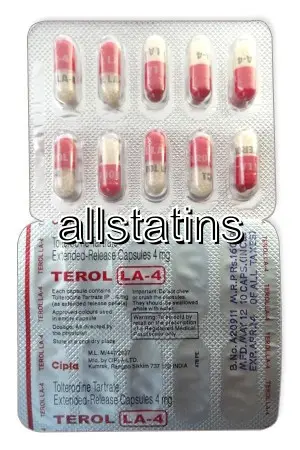| Package | Dosage | Price | Price per Dose | |
|---|---|---|---|---|
| Dosage: 1mg | ||||
| 360 pill | 1mg | NZD1,615.16 | NZD4.49 | |
| 180 pill | 1mg | NZD840.47 | NZD4.67 | |
| 120 pill | 1mg | NZD571.27 | NZD4.76 | |
| 90 pill | 1mg | NZD448.64 | NZD5.00 | |
| 60 pill | 1mg | NZD314.04 | NZD5.23 | |
| 30 pill | 1mg | NZD167.47 | NZD5.62 | |
| Dosage: 2mg | ||||
| 180 pill | 2mg | NZD1,037.88 | NZD5.77 | |
| 120 pill | 2mg | NZD702.88 | NZD5.86 | |
| 90 pill | 2mg | NZD559.31 | NZD6.22 | |
| 60 pill | 2mg | NZD400.78 | NZD6.70 | |
| 30 pill | 2mg | NZD221.31 | NZD7.36 | |
| 10 pill | 2mg | NZD80.73 | NZD8.02 | |

Tolterodine Description
Overview of Tolterodine
Tolterodine is a medication commonly prescribed to manage symptoms associated with overactive bladder. It belongs to a class of drugs known as antimuscarinics, which work by relaxing the muscles of the bladder. This relaxation helps to reduce the urgency and frequency of urination, providing relief for individuals suffering from urinary incontinence or bladder spasms. Tolterodine is available in both immediate-release and extended-release formulations, offering flexibility to meet different patient needs.
How Tolterodine Works
The primary mechanism of Tolterodine involves blocking the action of acetylcholine on muscarinic receptors in the bladder. Acetylcholine is a neurotransmitter that stimulates bladder contraction. By inhibiting these receptors, Tolterodine decreases involuntary bladder contractions, which are often the cause of urgency and leakage. This targeted approach helps improve quality of life for patients experiencing frequent urination and incontinence episodes.
Benefits of Using Tolterodine
Many users find Tolterodine highly effective in controlling their overactive bladder symptoms. The medication tends to decrease the frequency of urination and lessen episodes of urgency and accidents. Extended-release forms are preferred by some because they typically cause fewer side effects and offer a smoother symptom relief throughout the day and night. When taken as directed, Tolterodine can significantly improve daily comfort and confidence.
Possible Side Effects
As with many medications, Tolterodine may cause side effects in some individuals. Common adverse effects include dry mouth, dizziness, blurred vision, constipation, and headache. Some users may also experience urinary retention or difficulty urinating. It is important to discuss any unusual or severe side effects with a healthcare provider promptly. For many, these side effects are mild and tend to decrease over time.
Precautions and Considerations
Before starting Tolterodine, patients should inform their healthcare provider about any pre-existing health conditions, especially glaucoma, urinary retention, or gastrointestinal obstructions. The medication should be used with caution in elderly patients, who may be more susceptible to side effects such as dizziness or confusion. It is also essential to avoid alcohol and other central nervous system depressants while taking Tolterodine, as these can enhance side effects like dizziness or drowsiness.
Usage and Dosage
The typical dosage of Tolterodine varies depending on the formulation and individual patient factors. Usually, the immediate-release tablet is prescribed at a dose of 2 mg twice daily. Extended-release forms are often dosed at 4 mg once daily. Patients should follow their healthcare provider’s instructions carefully and not adjust the dose without consultation. Consistent medication intake is key to achieving optimal symptom control.

